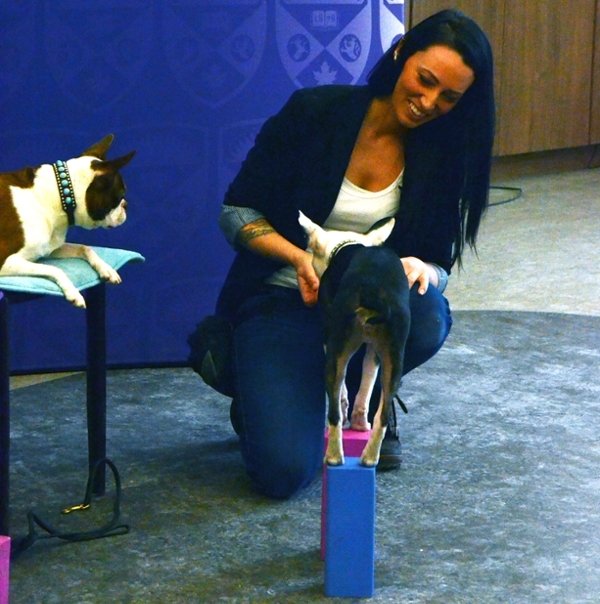
What do two dogs participating in a lecture have to do with the Faculty of Education? On the surface it may not seem there’s a connection, but in reality, they can teach graduate students a lot about changing behavior.

What do two dogs participating in a lecture have to do with the Faculty of Education? On the surface it may not seem there’s a connection, but in reality, they can teach graduate students a lot about changing behavior.
Melissa Millet, the star of the television program Doggy house calls, founder and head trainer of In dogs we trust and the stunt dog show, Ultimutts, presented a guest lecture to Western Education faculty and to students in the Master of Professional Education (MPEd) in Applied Behavior Analysis (ABA) program. She demonstrated what students in the program have been learning – how the principles of dog training can be used to change the behavior in people.
Dr. Nicole Neil, Assistant Professor, Board Certified Behavior Analyst and Coordinator of the MPEd in ABA program, said there’s plenty of research that indicates the same principles used in dog training can be used on humans. She added ABA is the study of scientific principles applied to specific situations, such as developing communication and social skills for people with autism or Down syndrome.
One key principle that has been found to change behavior in dogs and people is positive reinforcement training. Neil said to produce desired behavior in dogs, owners should use what the dog likes, such as treats or toys. For example, if the dog receives a treat after being told to lie down, the dog will be more likely lay down in the future.
“It’s the same idea with adults, kids or kids with disabilities. If you get things after a desired behavior, it’s more likely you will see that behavior again,” said Neil.
Neil also said that positive consequences for children can include, “high fives, tickles, a favourite sandwich or quiet time.”
However, changing an unwanted behavior doesn’t happen right away. It takes time. Shaping is another tool that’s used to modify behavior.

Melissa Millet demonstrates the principles of dog training during a guest lecture in the MPEd in the field of ABA program.
“You reward approximate, small steps,” said Neil.
Millet demonstrated shaping by having a dog learn how to use a skateboard. In order to accomplish this task, Millet taught a series of steps. First, she rewarded the dog with a treat when it had two paws on a rug. Then, a treat was given when the dog had four paws on a rug. Once the animal was comfortable stepping on the rug, Millet added an additional step, she placed the rug on a skateboard. The process started all over again as Millet gave a treat when the dog placed two paws on the skateboard. Then, she gave another treat when the animal placed four paws on the skateboard. With the animal standing on the skateboard, Millet was able to push it.
While positive reinforcement and shaping are two ways people can use to modify behavior in others, the final principle that can change behavior involves doing nothing. Extinction is a technique where poor behavior isn’t rewarded.
“Nothing happens for behavior that you don’t want to occur,” said Neil.
She said, for example, if an owner doesn’t want their dog to tug on the leash when the dog wants a pet, the owner shouldn’t pet the dog when the leash is tugged. The same principle applies to humans, especially children who are experiencing a tantrum. While it’s easy to give in, children shouldn’t receive a reward for exhibiting poor behavior.
Since the MPEd in the field of ABA is an online course, the lecture was recorded, which allowed students to watch it at a later time if they couldn’t see the lecture live. Neil added most students already work in the ABA field but they’re in the Master’s program to improve their skills so they can increase their effectiveness at work.